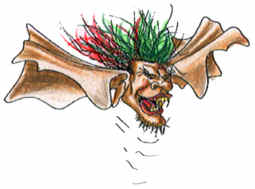The Chonchon is a mythical bird of the Mapuche mythology, also present in the Chilean and southern Argentinan folkore.
Etymology
Chonchón is from the language mapudungun.
Description/Morphology
The Chonchon has the shape of a human head with feathers and talons; its ears, which are extremely large, serve as wings for its flight on moonless nights. They are known for their cry of "tue tue tue" during their flights.
Powers
The Chonchon is the magic transformation of the powerful kalkus (mapuche sorcerer), that knows the secret of the Kalkus, to become this feared creature. Chonchons are supposed to be endowed with all the magic powers of and can only be seen by other kalkus, or by wizards that want this power. The kalku or the sorcerer would carry out the transformation in Chonchon being anointed by a magic cream in the throat that makes his head removed from the rest of the body, and his head become this creature
The Chonchon is considered a mythical bird that announces "bad luck", and the form in that the kalkus use to carry out easily their wicked activities.
Art/Fiction
- The Chonchon appears in the games Castlevania: Symphony of the Night and Terranigma as a common enemy. It is noticeable by its large ears. (In the original English translation of Castlevania: Symphony of the Night it is known as the Bitterfly.)
- The MMO Ragnarok Online contains an enemy which is named "Chonchon" but in no way resembles the mythological creature; instead it is in the form of a large fly.
- The Chonchon also makes an appearance in the MMORPGs Final Fantasy XI and Mabinogi as a featherless birdlike creature.
References
- Constantino Contreras 2000 (in Spanish). Unidad temática y variedad textual: un tópico social en tres relatos orales, Estudios Filológicos, N° 35

